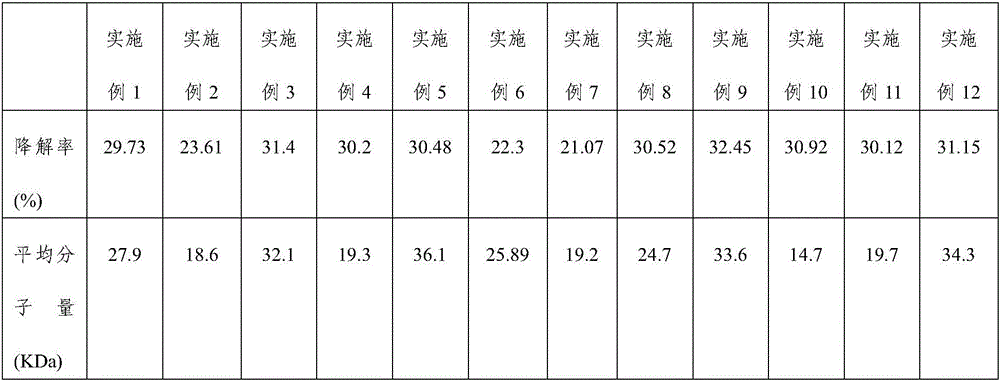Method for preparing low-molecular-weight polysaccharide
A low-molecular-weight, high-molecular-weight technology, applied in electrodes, electrolysis processes, electrolysis components, etc., can solve the problems of product structure and activity destructive, unsuitable for industrial expansion, low degradation rate, etc. Inexpensive raw materials and high extraction rate
- Summary
- Abstract
- Description
- Claims
- Application Information
AI Technical Summary
Problems solved by technology
Method used
Image
Examples
Embodiment 1
[0053] A method for degrading lentinan by using the electric Fenton method: take 1600g lentinan (molecular weight 500KDa), disperse it in 1.6Kg absolute ethanol, add it to 10L distilled water, make a concentration of sugar solution that is 160mg / ml, pack In an electrolytic cell with a volume of 30 L, weigh 85.2 g of sodium sulfate and dissolve it in the polysaccharide solution, and adjust the pH to 3 with 1 mol / L hydrochloric acid. Use 30cm×20cm barbed wire as the anode, 30cm×20cm porous graphite as the cathode, the distance between the two electrodes is 6cm, and 13V direct current is applied, and the current density is 10mA / cm 2 , and use the aeration device to feed in purified air at a speed of 2.0L / min (or to feed in oxygen at a speed of 0.6L / min, the aeration device contains two vent holes, and the two vent holes are blown into oxygen at the same time), per liter The amount of air introduced into the thick lentinan solution is about 24L (the amount of air introduced into t...
Embodiment 2
[0055] A method for degrading lentinan by using the electric Fenton method: take 900g lentinan (molecular weight 500KDa), disperse it in 0.72Kg dehydrated alcohol, add it to 10L distilled water, and make a sugar solution with a concentration of 90mg / ml. In an electrolytic cell with a volume of 30 L, weigh 71 g of sodium sulfate and dissolve it in the polysaccharide solution, and adjust the pH to 3 with 1 mol / L hydrochloric acid. With 20cm×20cm barbed wire as the anode and 20cm×20cm porous graphite as the cathode, the distance between the two electrodes is 5cm, and 13V direct current is applied, and the current density is 12mA / cm 2 , and use the aeration device to feed oxygen at a rate of 0.5L / min. The aeration device contains two vent holes, and the two vent holes are blown into oxygen at the same time. The amount of air per liter of crude lentinan solution is about 4.0L. The stirrer was stirred at a speed of 250rpm. After electrolysis at room temperature for 40 minutes, the p...
Embodiment 3
[0057] A kind of method that adopts electric Fenton method to degrade pachyphyllum: take by weighing 2000g polysaccharide (average molecular weight 452KDa), be dispersed in 2.0Kg dehydrated alcohol, join in 10L distilled water, make the sugar solution that concentration is 200mg / ml, pack into an electrolytic cell with a volume of 30 L, weigh 99.4 g of sodium sulfate and dissolve it in the polysaccharide solution, and adjust the pH to 3 with 1 mol / L hydrochloric acid. Use 30cm×30cm barbed wire as the anode, 30cm×30cm porous graphite as the cathode, the distance between the two electrodes is 5cm, 13V direct current is connected, and the current density is 14mA / cm 2 , and use an aeration device to feed oxygen at a speed of 0.6L / min. The aeration device contains two air holes, and the two air holes are blown into oxygen at the same time. The amount of air introduced into each liter of crude pachyphyllin solution is about 7.2L. The stirrer is stirred at a speed of 250rpm. After ele...
PUM
| Property | Measurement | Unit |
|---|---|---|
| Density | aaaaa | aaaaa |
Abstract
Description
Claims
Application Information
 Login to View More
Login to View More - R&D
- Intellectual Property
- Life Sciences
- Materials
- Tech Scout
- Unparalleled Data Quality
- Higher Quality Content
- 60% Fewer Hallucinations
Browse by: Latest US Patents, China's latest patents, Technical Efficacy Thesaurus, Application Domain, Technology Topic, Popular Technical Reports.
© 2025 PatSnap. All rights reserved.Legal|Privacy policy|Modern Slavery Act Transparency Statement|Sitemap|About US| Contact US: help@patsnap.com


